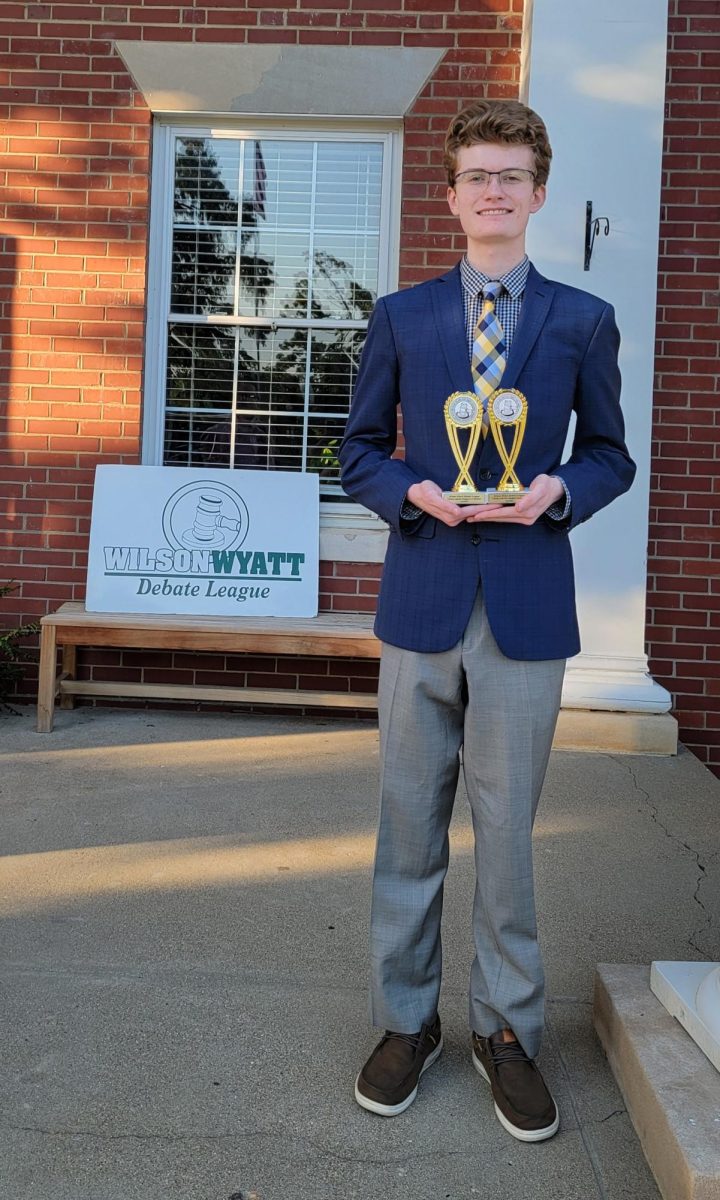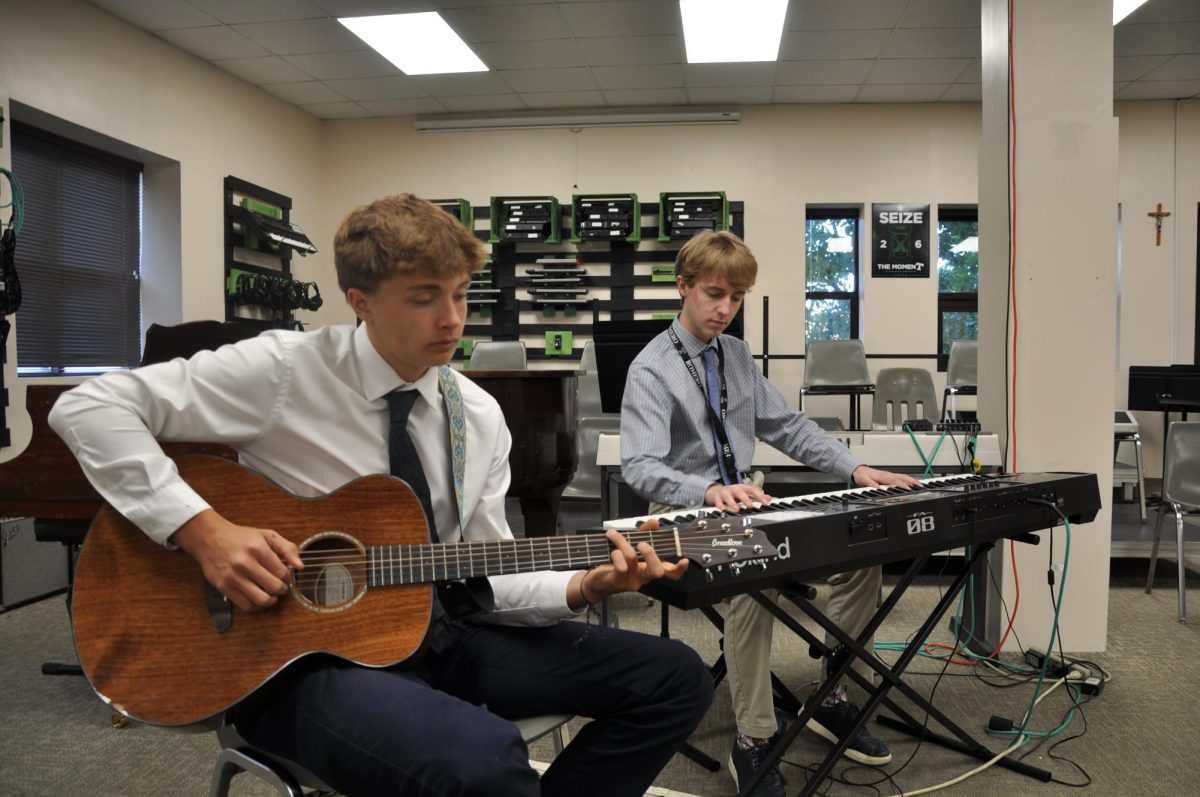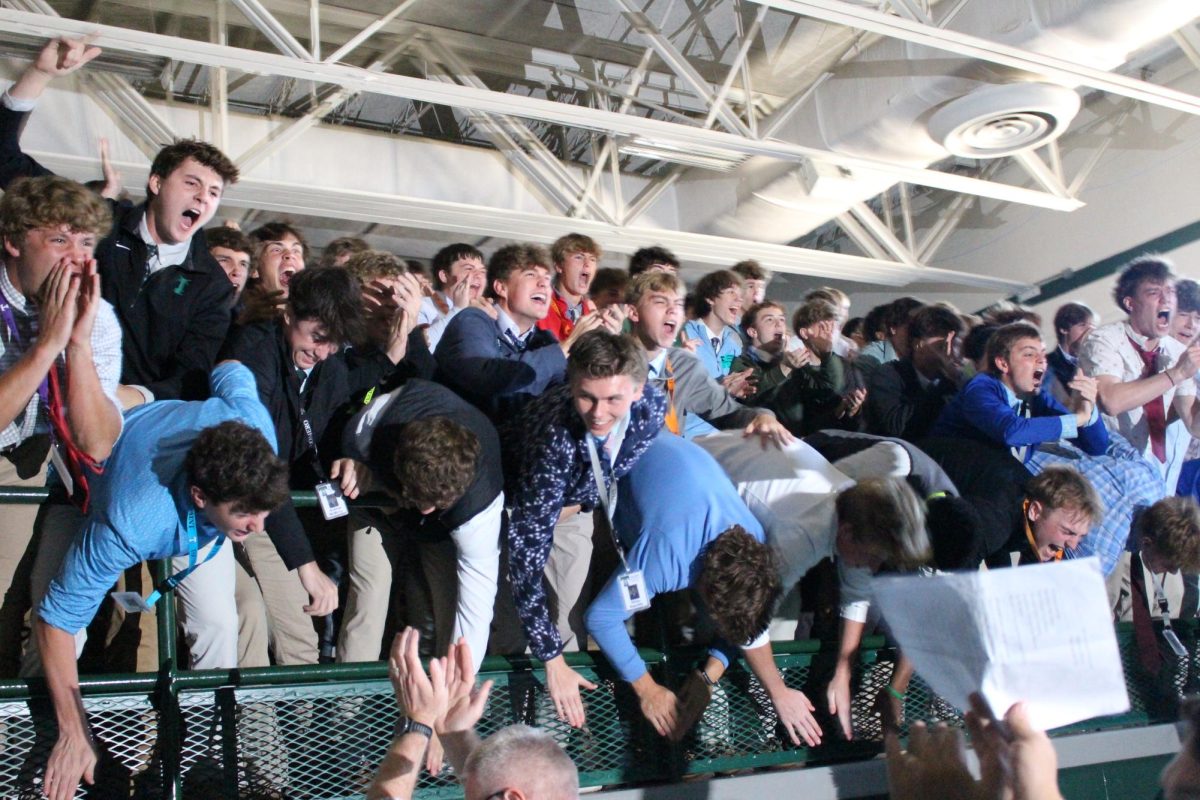“I am writing to ask you to reconsider your antiquated and discriminatory policy that bars openly gay youth and troop leaders from serving in the Boy Scouts of America. While I understand the many diverse views of your membership, I believe this discriminatory policy runs counter to the mission of your organization, which seeks to instill in our nation’s youth the values of fairness, courage, honor, and respect for others.”
These words are from a letter sent by Rep. John Yarmuth to Mr. Wayne Brock, Chief Scout Executive of the Boy Scouts of America, Nov. 27. Yarmuth’s letter references the case of Assistant Scoutmaster Greg Bourke, who worked with the Boy Scouts of America for seven years until he was forced to resign by the local council of the BSA, the Lincoln Heritage Council, for being gay.
The council went through many hoops to get Bourke to resign, and finally, he was forced to at the end of summer 2012. Although Bourke was shocked by the situation, he saw it coming. A St. Xavier and Notre Dame graduate, Bourke, 54, has been openly gay for 30 years.
“I was doing my best to live an openly gay lifestyle, until I got involved with the Boy Scouts. It forced me to go back into the closet,” he said.
The Boy Scouts, founded in 1910, has a “do not ask, do not tell” policy. The organization does not ask adult leaders to state their sexual orientation on its application. The Boy Scouts will not remove a member for being gay, unless it is publicized by the individual.
Knowing the Boy Scouts’ policy regarding gay members in its organization, Bourke was reluctant to join the Cub Scouts, a division of the Boy Scouts for younger Scouts. Due to a shortage of parents able to help out with his adopted son and his son’s classmates during their third-grade year, Bourke was “forced reluctantly” to become a leader.
“Having been a Scout myself,” he said, “I wanted my son to have this experience. I felt like I needed to do it.”
Bourke’s hope was to get his son through fifth grade in Scouting and then turn his son over to the Boy Scout troop in the sixth grade and leave his leadership position.
He said, “I was hoping I was going to be a bridge for my son, turning him over to the Boy Scouts.”
However, when the time came, the Boy Scout troop’s leaders were leaving as Bourke’s group came in. In a similar situation he experienced with the Cub Scout pack, Bourke again became involved with the troop.
Over the last year, Bourke became uncomfortable with being in the Boy Scouts of America. The GLBT (gay, lesbian, bi, trans-sexual) group that he is a part of at his place of work, Humana, pressured him to take a stand.
“I’ve taken a lot of heat from GLBT members who don’t understand how I could be involved with the organization, given its position,” Bourke said.
He then came to the realization “I can’t do it anymore.” Bourke approached the Lincoln Heritage Council in emails to open a dialogue about the Boy Scout’s policy and how it could be changed. He then identified himself in the emails as “openly gay.”
Bourke persistently tried to set up a meeting with local Scout executive Barry Oxley to talk about the organization’s policies. Bourke said, “He ignored me for about two weeks. We finally started exchanging emails, where he then agreed that we would meet and talk it through at summer camp. I knew we were both going to be at the summer camp Scout leader breakfast on Wednesday.”
Council Commissioner Mac Barr then approached Bourke.
“Mr. Barr delivered the unfortunate news that I would not be able to continue in my current position,” Bourke said. “He requested that I resign by Saturday. There was no discussion about what might be done to reform the policy.”
According to Bourke, Barr stated at the time that “it’s a simple matter of policy” and that Bourke would not be able to continue. Bourke responded to the request to resign by stating, “I am at camp. I am busy, and I do not have time to think about it. I will let you know.”
After returning from camp, Bourke decided he would not resign. “I was not going to make it that easy on them. They didn’t treat me fairly.”
Adding to the drama, council members were also pressuring three other troop leaders to get Bourke to resign during the week Bourke was at summer camp. Two other Troop 325 leaders visited Bourke at camp to talk about what was going to happen.
“It was interesting,” he said. “They were very supportive and did not want me to resign.”
The troop’s committee, made up of parents of current and former Scouts, also refused to intervene. During the next few weeks council executives approached Our Lady of Lourdes pastor Father Scott Wimsett in an attempt to get Bourke to resign. Wimsett would not do it, according to Bourke.
The Lincoln Heritage Council then approached the Archdiocese of Louisville in another attempt. Father Jeff Gatlin “didn’t approve of their policy and stated this was a Boy Scout matter and not a Catholic Church matter. He refused to get involved,” Bourke said. “The Lincoln Heritage Council struck out four times.”
The council went back to Wimsett and told him if Bourke did not resign or if Bourke was not forced to leave, the troop’s charter would be at risk. A removal of the charter would prohibit the church’s Boy Scout division to operate.
Bourke then agreed to resign “so that Father Wimsett wouldn’t have to (force me to resign) or put the troop’s charter at risk.” Bourke then tendered his resignation to the Lincoln Heritage Council, ending his role as a leader in the organization.
Council spokesperson Kelly Masterson stated, “In July, this former Assistant Scoutmaster proactively notified local and national BSA leadership that he does not meet Scouting’s membership standard on sexual orientation. Based on this action, BSA leadership met with the individual, and he made the decision to tender his resignation from Scouting. In late July, Mr. Bourke submitted a resignation letter to Scout Executive Barry Oxley. The Council has pledged to continue to support his family, as it remains involved in Scouting. Our protocol with any volunteer situation requires contact with the charter organization to keep them informed. As a voluntary, private organization, the BSA sets policies that are best for the organization but does not proactively inquire about the sexual orientation of employees, volunteers or members. The BSA values the freedom of everyone to express their opinion and believes to disagree does not mean to disrespect.”
After a few weeks passed and after talking with others “to piece together the whole picture,” Bourke became angry about the situation. Bourke contacted friends, family and other associates, asking them to write emails and letters to the local and national council to let them know they disapproved of the situation.
He was then contacted by The Courier-Journal. The first article started to publicize the situation, even nationally.
“I started to get a lot of support,” Bourke said. Shortly after the support began pouring in, Bourke became aware of the website Change.org through another Scout leader in Ohio who was forced out of the organization for being a lesbian — a similar situation to Bourke’s.
According to Jennifer Tyrrell’s Change.org petition, which has more than 300,000 supporters, “I was recently removed from this volunteer position, and my membership was revoked after nearly a year of service – just because I happen to be gay.”
Tyrrell encouraged Bourke to start a similar petition. Urged by Tyrell’s support, Bourke started a petition on Change.org, asking the Lincoln Heritage Council to take a stand against the Boy Scouts of America’s national policy. He has garnered more than 4,000 supporters.
“We, the Scouts and other community members urge the Lincoln Heritage Council to reject the Boy Scouts of America’s anti-gay policy,” the petition stated.
Petition signers’ views looked to be locked together. One signer said, “(Bourke) is an exceptional man with qualities that go way beyond your typical Boy Scouts leader. I believe it is Greg’s passion for humanity that makes him a superior leader. The troop has not been the same without him. Even though he was forced out, he is still the glue holding us together. Major mistake on BSA. I pray they wake up, smell the campfire coffee and learn that leadership, intelligence and good mentors for our young men are hard to find. I do not think it was kind or courteous to pass this decision on to Mr. Bourke.”
Another signer stated, “This is an injustice.”
Several scouts who experienced Bourke’s leadership attend Trinity High School, including his son. Trinity junior Geordie Ayers, a Life Scout who has been a part of Our Lady of Lourdes’ Scouting program since second grade, expressed how Bourke helped him: “I think he was a good role model. He was always courteous. By Scout meetings alone, unless you were told by someone, you would not know he is gay. I do not see how him being gay could affect Scouting.”
The Rev. Donald E. Overton, a retired Episcopal priest, Army chaplain and Troop 325 assistant scoutmaster, expressed his gratitude towards Bourke: “Greg’s devotion to the principal of Scouting were such that his personal life never brought any outside issues into the program. As with the military and the government, the issue of being gay is an institutional problem and not one of character or behavior on his part. Scouting needs to rethink its current stand on gay leaders.”
During a Supreme Court case held in 2000, it was decided that the Boy Scouts has the right to expel a gay member because it is a private organization. The Boy Scouts also has a similar policy on atheists. Many came to believe the Boy Scouts was on the way to changing its policies after launching an internal review two years ago. However, the Boy Scouts reaffirmed its policy earlier this summer.
“They can pick any rule they want to enforce. They had a perfect opportunity to change it,” Bourke said. “During the same time period, the United States military started admitting openly gay people.”
Why do the Boy Scouts have policies against gay members? Bourke said it was explained to him by one Scout executive that “so many of the sponsoring organizations of the Boy Scouts of America are churches. They would not find it acceptable to have a Boy Scout troop that would invite gay members.”
Bourke said, “The suggestion that gay leaders would not be accepted in the view of church organization just doesn’t hold water with me.” When asked about how his church community has treated him as a person living openly gay, Bourke said, “I have never had a problem. I have served on the worship committee. My partner and I have been involved with several church events. This particular parish has been very welcoming.”
Bourke has worked with the Girl Scouts of the United States of America for the past seven years with his adopted daughter. The Girl Scouts does not discriminate based on sexual orientation. In the Girl Scouts Bourke said he felt comfortable, able to live out of the closet.
Bourke said, “There are so many people not putting their kids in the Boy Scouts because of the policy. You will not believe the number of people that have told me they have taken their kids out of Scouting or will not put their kids in Scouting because of the policy. The Boy Scouts are losing a lot. The (Boy Scouts) need to wake up and recognize that.”
Trinity science teacher and Troop 30 Scoutmaster Dan Sturtzel said, “Boy Scouts followed the national policy. The policy is well published. You don’t get to change the policies you don’t agree with. You have to do what the majority of the membership wants. The discussion of sex and sexual orientation has no place in Scouting.” He added that while he is aligned with the organization’s policy, he respects Bourke’s choice.
Bourke did not blame members of the Lincoln Heritage Council when he sat down to talk. He put the blame on the Boy Scouts as a whole for its policies. He said the Lincoln Heritage Council executives were just doing their job.
Yarmuth’s letter closes with a challenge to the BSA: ” By discriminating against openly gay youth and troop leaders, you are sending the message that bullying, hatefulness and intolerance are acceptable, which completely undermines the very values BSA should uphold. I, therefore, ask that you reverse this policy in favor of one that truly values openness and inclusion for all – regardless of sexual orientation.”
Still serving as a parent in the troop, though unable to wear the uniform, Bourke continues his fight for change. “Some day I’ll probably write a book about it.”
Disclosure: This reporter has known Greg Bourke for many years and has been involved with him in Scouting. Don Overton is a family relative of this reporter. Father Scott Wimsatt and members of Troop 325’s board declined to comment. Additionally, Jeff Gatlin, Mac Barr, and Barry Oxley could not be reached for comment.







